OI Discussion: Relevancy
(The following is a recent discussion on the Only Influencers discussion list led by Kate Barrett. Join Only Influencers to be part of the discussion)
Hi everyone!
I have the absolute pleasure of leading the discussion this week and I’m so excited to see what we all come up with on this one!
Hopefully you’ve all seen my blog post (published last week) on the OI site. If not, you can find it here: ‘Reviewing our Relevancy: How Can Marketers Evolve to Keep Up with Entitled Consumers?’
So, this week’s topic is all about relevancy!
The recent DMA 2019 Marketer Tracker Report reported that only 14% of consumers think that over half of the emails an organisation sends are relevant to them as individuals.
But maybe more shockingly, only 55% of marketers think that more than half of all the emails they send are relevant.
In the article, I’ve outline 3 main reasons why I think this is:
- We put the needs of the business before the subscriber
- The intention is there, but marketers lack the time and resources to get out of our day-to-day tasks and actually strategize OR don’t have the knowledge to do so
- Our data isn’t in the right places to be utilized in an intelligent way
And I’ve also suggested 3 things I think we need to do to start to address this issue…
- Truly understanding our audience – and use new technology to help us do this better, and faster than ever before
- Further embrace automation to lift the day-to-day burden of build and send activity on marketing departments, and deliver timely messaging to subscribers
- Let’s get interactive and make it easier for subscribers to take action on our messaging
I know there are many more points that could be made for why and how, in order to move strategies forward – and that’s where I’d like us to focus our discussion this week!
- What are the common barriers to successfully implementing personalized, relevant campaigns into yours/your client’s strategies?
- How can we overcome these to improve our reputation as an industry and increase relevancy in our communications?
Looking forward to reading all your thoughts!
The main reason most email marketing programs aren't as relevant to their subscribers as they could be hasn't changed in 20 years.
A mediocre email marketing program will usually return a positive ROI, so the motivation to do the 25 things needed to make your program world class isn't there in every organization.
When I used to meet with clients a lot, I would try to get them to understand how much money they were potentially "leaving on the table." I think many marketing organizations focus too much on "measuring the past rather than measuring the possible."
Kate
I totally agree. It’s such a shame!
So in your experience, what’s the best way to get them to ‘measure the possible’? How have you found the best way to ‘win’ these types of conversations?
As I mentioned in the article, for this very reason I think marketers need to become much better at championing the possibilities of email - certainly something I do with my clients all the time through working out lifetime value and potential impact on this figure etc.
Loren
To quote Jack Parlance in City Slickers, "one thing."
One of my favorite client conversations was with marketing team at a motorcycle parts/accessories ecommerce company. I led a 4-hour presentation/conversation around best practices. At the end they were like "OMG, where do we start?" I replied "You know." They looked a little stunned, and then I asked them again and they all smiled.
Through some prodding I had uncovered their Pareto Principle (80/20 rule). They had an Amazon Prime like program (annual fee gets you free shipping, access to sales before the public, etc). The vast majority of their sales came from members of this program. Yet, they were seeing a decent number of people not renewing and the program membership wasn't growing as much as they had hoped. Yet, they weren't really doing anything special to grow membership, didn't have a great onboarding program and weren't tracking behavior of members to create programs to minimize non-renewals of memberships.
The "one thing" to focus on was now clear and the team had their marching orders on where to focus their limited time and resources to gain the biggest payback. It was also a program that would obviously have clear support from company executives.
I agree with your point, “The main reason most email marketing programs aren't as relevant to their subscribers as they could be hasn't changed in 20 years”, but not sure I agree with your reasoning. In my view it is simply because relevance is an outcome not a goal.
It is like happiness or world peace. You are happy or there is peace, because you/everyone has a job and a full belly.
Relevance is the blue pill, it offers marketers a life of luxurious security, tranquil happiness, and the blissful ignorance, business stakeholders (and increasingly customers) however would rather the red pill - of knowledge, freedom, and the truths of reality.
This is extremely relevant to my team at Roku. As a media and technology company we collect a ton of data on our customers – what device(s) they have, what they watch on the Roku Channel – even how strong their Wifi signal is ...etc.
There’s not a ton of strategy when it comes to outbound marketing communication – even in the face of declining engagement in the channel.
Marketing runs at warp speed at Roku – but the Data / Engineering teams that focuses on completing the work to enable better use of data are resource constrained and have a dozen other priorities. When I joined Roku last year – there was little being done on contact capping, no communication preference center, no content preferences used to help our customers tell us what they want – yet we send them more and more email and seeing engagement with channel dropping year over year.
We want to get to the ‘relevant message to the right customer at the right time.’, but it’s a target rich environment on competing priorities.
In Q2, we will be collecting content preferences during our device activation process – we want to start using that information to better target our customers instead of the ‘one size fits all’ style. Other tools should be coming online this year for us… which will help with the ‘how’ – hopefully empowering us to answer the ‘why’.
Loren
Kate,
Two things:
- You say: " if we know that’s what subscribers want" - but I don't know that most marketing departments truly know what their subscribers want (they of course have a strong sense), especially at an individual level. If they had high confidence in the answer, they would probably organize around delivering against those individual needs. (This is where Jaffer chimes in with a rant about predictive analytics.)
- I actually think the outcome vs. goal issue is a key question. I think that is partly what Dela and I are saying. How many brands on this list have a monthly or yearly metric called "Subscriber Relevance"? I'm guessing zero (I'm sure many do have a proxy.) Rather, most probably have metrics and are measured on things like: Revenue, conversions, revenue per email, open rate, CTR, delivery rate, list churn, database growth, perhaps some type of engagement metric (percent of emails opened/clicked per subscriber), etc.
If a company's goal is to, for example, generate $10 million in ecommerce revenue in 2019, a model is built on database size/net growth, number of sends, open rates, click-through rates, conversion rates, AOV, etc. And presto ... they have targets to achieve their revenue goal for the year.
Where is individual subscriber relevance in this model? I'm not saying it shouldn't be, just that it isn't likely included in many marketer's models unless they have a data science team, are using a subscriber scoring model, etc.
Relevance is more of a process metric than an output metric like conversions or revenue. For "relevance" to play a bigger role in email marketing, I think it would need to become a more common, perhaps standardized metric that people benchmarked against and could make compelling correlations to its impact on their end goal (revenue, renewals, product usage, etc).
Arguably relevance is a 2-step process:
Build a profile for each consumer
Today's consumer uses multiple devices and engages with brands across different channels on his or her purchase journey. This creates a need to build a unified customer profile across all of these touchpoints. Spotify calls this a ‘taste profile’.
Content ranking
Then when you understand what each consumer likes, you can dynamically rank content for each consumer. That is, calculate a score that represents the relevance of each piece of content for each consumer (based on the attributes of the content and the learned preferences of the consumer).
On the question of metrics, marketers can address each of these 2 issues sequentially. IE, (1) do we have a nuanced understanding of what each person actually likes? And (2) how do we engage consumers with fresh and relevant content based on their individual profile?
In practice, marketers will always have some ‘ghost’ customers from whom there's insufficient data to build a taste profile but (as you know) digital marketing generates a deluge of data so most OI marketers will have sufficient data to maintain a profile for the vast majority of their customers.
Relevance driven by learning-to-rank has the added benefit that it removes c. 95% of the gruntwork in campaign production - so marketers have more time for strategy and other value-added activities.
For me, there are two aspects at play:
1) What the consumer wants to see. We can infer this by their behavior (what they open, click, buy, read online) or can get express preferences from forms (etc.)
2) What the marketer wants to show. This is typically driven by business priorities. In an eCommerce scenario, this will often be the current promotional items, or the products with highest margin, or the products which are overstocked.
Using only approach (1) will lead to an unhappy marketer - or a marketer with no job. Using only approach (2) will lead to decreasing engagement, higher unsubscribes, etc. So neither of these strategies is enough on their own
I tend to advocate a blended approach, in order of priority:
1) Allow the marketer to pin certain content to the top, e.g. the current top promotional banner, or the current products that the marketer wants to promote.
2) Allow the marketer to prioritise content based on express preferences, where these are available.
3) Automatically prioritise content based on inferred interest
4) Where sufficient inferred interest is available, automatically prioritise content based on "typical" responses from the overall audience.
This approach requires some setup, but greatly reduces the ongoing cost of creating emails that effectively convert.
Dela
Digital Marketers in general and Email Marketers in particular LOVE relevance. It is their catnip, because it allows them to feel better about what they do, which is manipulate people. What we are supposed to do is make them buy stuff they might not need with money they might not have.
Giving people what they want or only what is relevant to them sounds and feels so much better. Best of all it is SUPER easy to get consumers/customers to say they want relevance even though the data (and they if you ask the right question) says they don’t.
This is at the very core of the issue Kate identified, which in her words is “why aren’t we sending more relevant emails to better engage our prospects and customers, and more successfully lead them through to the next stage in their journey with our brand and ultimately to enable more conversions”. We are conflicted and it is often the wrong thing to do.
Let me give you some examples from the data Kate shared.
Adobe
In the chart from the Adobe consumer survey, they asked consumers, if they could change one thing about the emails they get from brands what would that be?
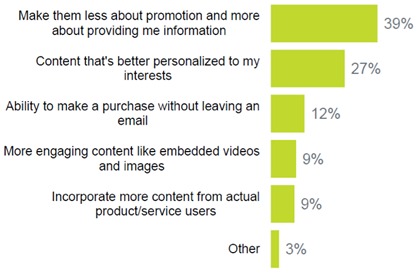
This is the chart and it would be natural to think consumers “lean heavily towards a content and contact strategy that is more about the consumer and NOT just selling with no thought behind why and how”.
Now look what they say when the question is what are you most interested in receiving from a brand
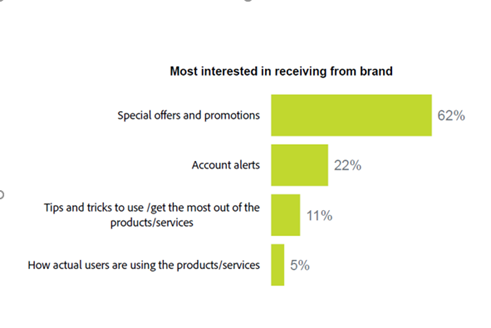
Note personalization has disappeared from their thoughts and how much they actually WANT offers from us.
DMA
The most recent DMA consumer tracker referenced reports only 14% of consumers think 50% of the emails they receive are relevant that has been consistently the case for years – I should know Alchemy Worx sponsored the report for 3 years so I had access to the underlying stats.
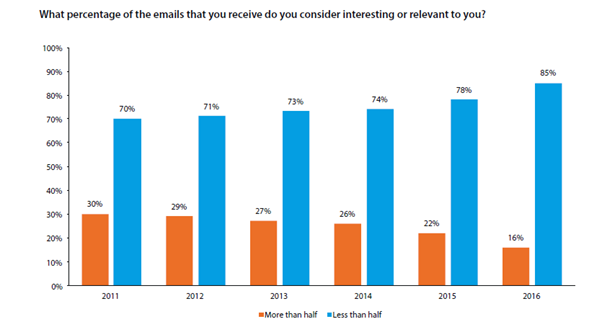
A question I made sure we also asked was how many email emails on average to do you receive a week from brands you trust. The options were as 1-5, 6-10…up to 41+ This is what we saw.
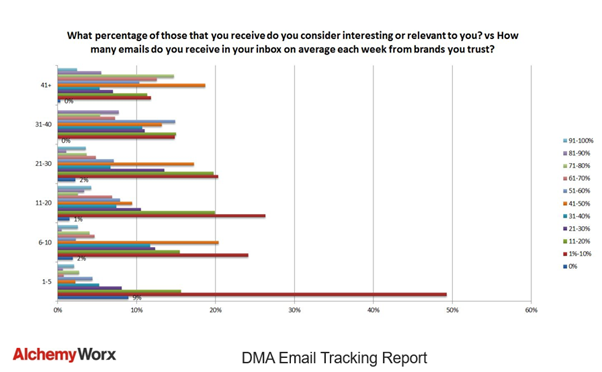
50% of the people who were subscribed to less than 5 email programs and therefore unlikely to be on your list felt less than 10% of the emails they got were relevant. Only 10% of the 41+ group thought that. The survey and the way the questions are framed are designed to make us feel we are failing on relevance. We talk about personalization and understanding our customers and yet we give equal weighting to email haters as we do people who love what we do!
Finally, I am going to question - perhaps I should say qualify the very notion that consumers/customers WANT relevance. In my view they want it until they understand what that means. In abstract like many things such as housing for the poor they say yes until you tell them to get it they have to pay more tax. I found this very interesting piece of research by the ICO (you can download the PDF here) into AdTech. This is the executive summary.
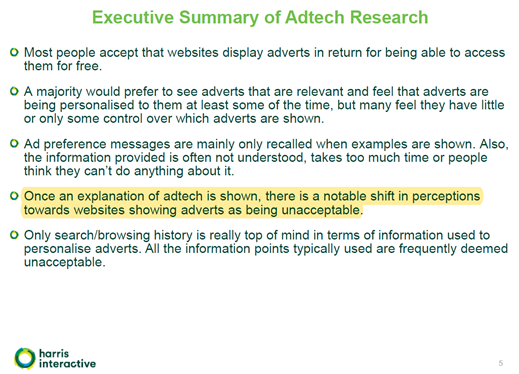
The point I have highlighted should concern us all as we in email seem to be rushing headlong into the kind of behavior that is causing Facebook so much pain. Consumers were asked if they wanted more relevant advertising and then were told how that was achieved. The numbers are startling.
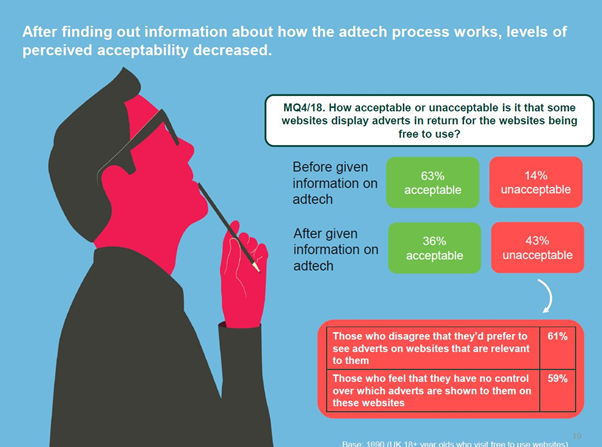
The conflict Kate describes is between what the data shows, customers say they want, if asked the right question (funnily enough it’s also what business stakeholders want) and what marketers would like their customers to want. Classic Head v Heart.
That is why [we aren’t] sending more relevant emails to better engage our prospects and customers, and more successfully lead them through to the next stage in their journey with our brand and ultimately to enable more conversions”.
It isn’t what they actually want.
PS Scientists are only just beginning to understand how little of our decision making is conscious or rational. I am not sure this is something the advertising and marketing community is ready to address. So I suspect many will not agree with my position.
I completely agree with you, Dela. People in our industry continually make the same mistake, whether it's marketers trying to reach consumers, or vendors trying to reach marketers. People tend to respond to questions with the answers they think they should be giving, even if they themselves don’t actually hold a certain opinion. Building strategies around what people say (as opposed to what they do) leads to dead ends. But because of this tendency, it is easy to frame questions that elicit the responses we want to hear. So whether it is thinking that consumers want "relevancy", or that email marketers are embracing things like programmatic add purchases, the end result is the same--buyers don't do what the sellers expect and everyone is disappointed in the results.
When Tim Watson and I asked “what do you expect to get after you sign up to receive emails”
In the Email Addiction Study, 74% of consumers answered “Offers and savings”.
That makes it the most popular answer.
I have noticed there is a misbelief with some, especially B2B and services companies that
selling is something to sortof sidestep or be ashamed of, because “people don’t want to be sold to”.

I blame Hubspot for enabling those inbound / hippy-marketing thoughts ;)
Commercial offers, well communicated, can be a part of the value that you bring to your subscribers.
PS: the study is here (open download, no registration needed)
https://www.emailmonday.com/email-addiction-email-marketing-research/
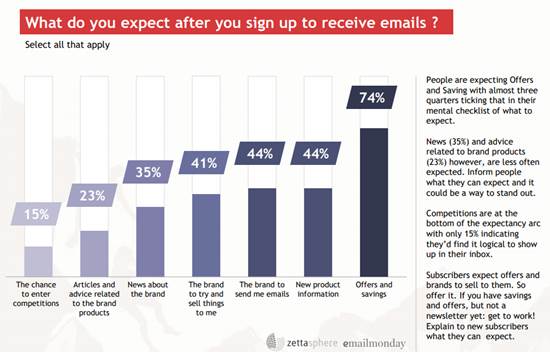
Peter
There's another issue with relevance: do you want to show content you know the customer already likes - or do you want to show content you aren’t sure about and possibly delight them with something new?
This happens all the time in everyday life — repeat last year's email strategy or try something new?; current ESP, or hunt around?; favourite restaurant or the new one?; and many more. You sacrifice one to have the other — it’s a trade-off.
Of course, there are different ways to optimise for this trade-off in email marketing.
Peter
P.S. Data Scientists refer to this as exploration vs exploitation. Machine Learning can help with this exploration vs exploitation trade-off in different ways, for example, Reinforcement Learning - https://en.wikipedia.org/wiki/Reinforcement_learning
What is relevancy anyway?
As Loren and other have reflected, just what does someone mean by relevance?
If someone says an email is not relevant to them was it simply they weren’t interested at that moment. That they weren’t in the market currently for the offer, rather than they would never purchase that type of item or from that brand?
Brands with huge diversity in SKUs, eg eBay, Amazon and the like, have a bigger problem relevancy than many brands.
When someone gives email permission to a niche fashion brand for twenty-somethings, then just about everything in the store is relevant. The subscriber identified themselves as wanting to hear from the fashion brand. They have said the brand is relevant to them.
Brands such as Groupon send a huge number of irrelevant offers, if the definition is an offer not taken up. I regularly ask people why they stay subscribed to Groupon. The answer is the same, they know once in a while there will be an offer they want. Whilst the other emails were not relevant, they don’t have an issue with ignoring or deleting them either. Groupon is still relevant to them.
Demand response or demand generation?
Email is great for demand response. Nudging an already revealed behavior a little further. A welcome email, abandon cart, follow-up on a trial signup that hasn’t been activated, browse abandon products, a cross sell to a related product.
Marketing is more than demand response. There is demand generation. Telling people about things they may never have considered or didn’t know that you offered. Things that may not be immediately relevant.
I helped a company that primarily sold hedging plants. The owner told me a story. He visited his brother in-law and saw a beautiful bed of lavender. Shocked he asked his brother in-law why he hadn’t bought the plants from him?
His brother in-law told him that he didn’t know he sold lavender too.
The owner never told his brother in-law about his full offer, the brother in-law didn’t ask because he assumed there was nothing offered.
Marketing is about letting people know what you can offer. To only tell people about things they have already shown interest in is to leave untapped demand.
Excellent point in your PS, Dela: "Scientists are only just beginning to understand how little of our decision making is conscious or rational. I am not sure this is something the advertising and marketing community is ready to address.”
In prepping for my “Psychology of Email Response” workshop for the EEC conference next week, I found the general research consensus to be that 90-95% of all decisioning is made from the subconscious mind. Heuristics (past decision-making patterns), shortcuts and emotional responses drive much of what we do, and we’re not even aware of it. Most of us are running on autopilot. If we didn’t we couldn’t possibly filter through all the empirical information it would take to make the hundreds of decisions needed per day, so this brain patterning serves a basic human survival purpose.
But when it comes to marketing, even though we may think we’re being rational and conscious, often we’re swayed by anything from timing to color to font size to imagery - all tugging at the subconscious or ignoring the mind completely and hitting our emotional centers. Not to mention whatever is going on around us (distraction, the mood we’re in, etc.)
I believe most consumers when asked could give a definition of “relevant” that lists specific points which would make an email (or whatever marketing campaign) relevant to them. But, their response behavior betrays them. People might desire or even crave more relevant messaging, but don’t always respond to it even when they get it due to myriad other factors influencing them at any given moment.
Loren
Let's kill the concept of relevancy.
So that is my takeaway from this week's discussion. Relevancy is not a goal. It is different and hard to predict for each individual. A meaningful metric it is debatable. Senders don't know what is relevant, and neither do recipients.
Companies use email marketing to achieve business goals. Sometimes that is to sell stuff. Sometimes that is to inform and provide content (and the sender monetizes it through ads, subscriptions, etc), sometimes it is help retain customers, sometimes it is to get you to donate money, renew a membership, remind you to make a payment or take your car to the dealer, or ...
Email marketing is a value exchange. Recipients provide their email address to a company in expectation of some type of value in return. Unsubscribes are a direct measure of when the value exchange no longer worked.
The fundamental measure of success for an email marketing program is Does it help achieve business goals? For Lyft as an example, it might be to not only get me to use them more often, but increase share of rides - shifting a higher percentage of rides to Lyft from Uber. In this case email is an important communications channel, but the key is the difference in brand promise - Uber = evil, stupid former CEO, dumb mistakes vs Lyft = the nice ride share company. Email's job for them is to use that core value proposition and brand promise and difference to bring it to life and convince users of both Uber and Lyft to shift more rides to Lyft.
Is that relevance? Does it matter? While probably not easy to measure, does Lyft's email program driver a higher share of rides?
Are there ways to use segmentation, personalization, behavioral data, et al to make individual emails of more value and interest to each individual subscriber - of course.
A few days ago I received this email from the Container Store. The Container Store tends to be expensive, so the 20% off got my attention (I don't often open their emails) - but then for me personally it failed ... as I was not motivated to go into a discovery process and look around and stumble across something that I did or did not need. If they had used some of my past click or in-store purchase behavior, and said 20% Off bicycle racks and any single item ... I probably would have clicked through.

So is relevance in this case measured by subscriber CTRs, purchases?
In the end, every company has to figure out what are their key business goals, how can email marketing help achieve those goals - and then establish the right metrics for measuring that contribution.
"Relevance" is probably not on the short list as a metric for most brands.

 How to resolve AdBlock issue?
How to resolve AdBlock issue? 
